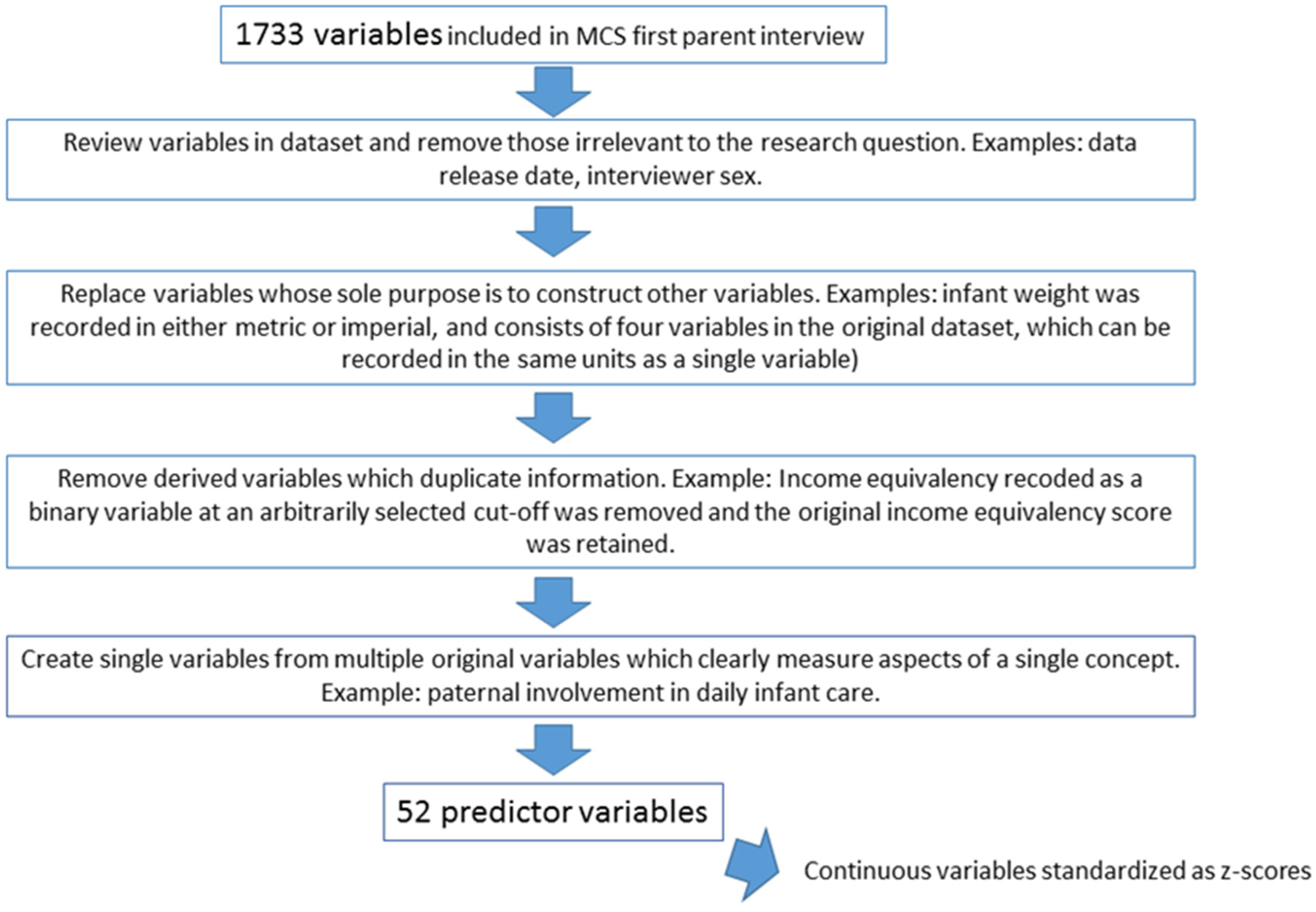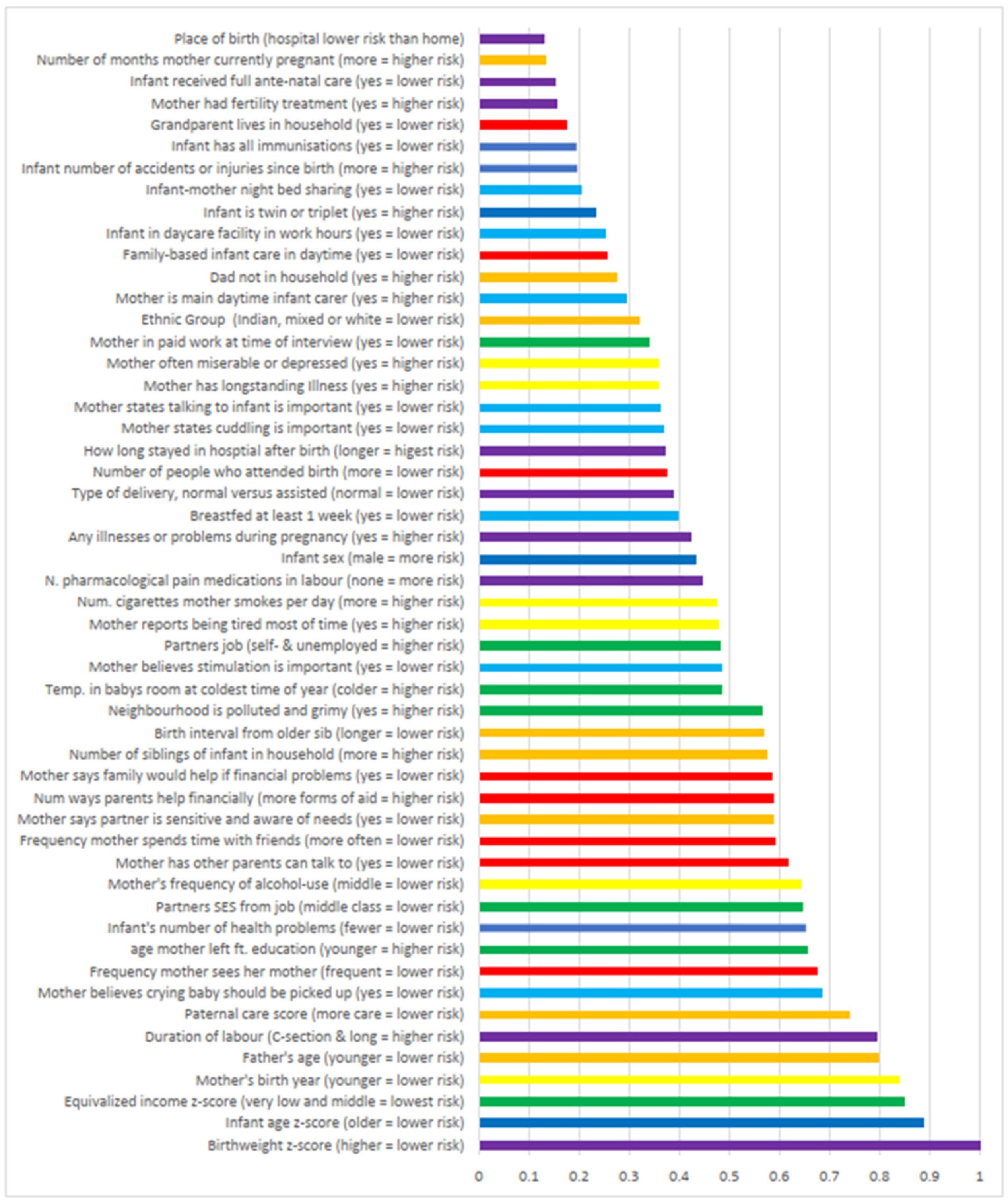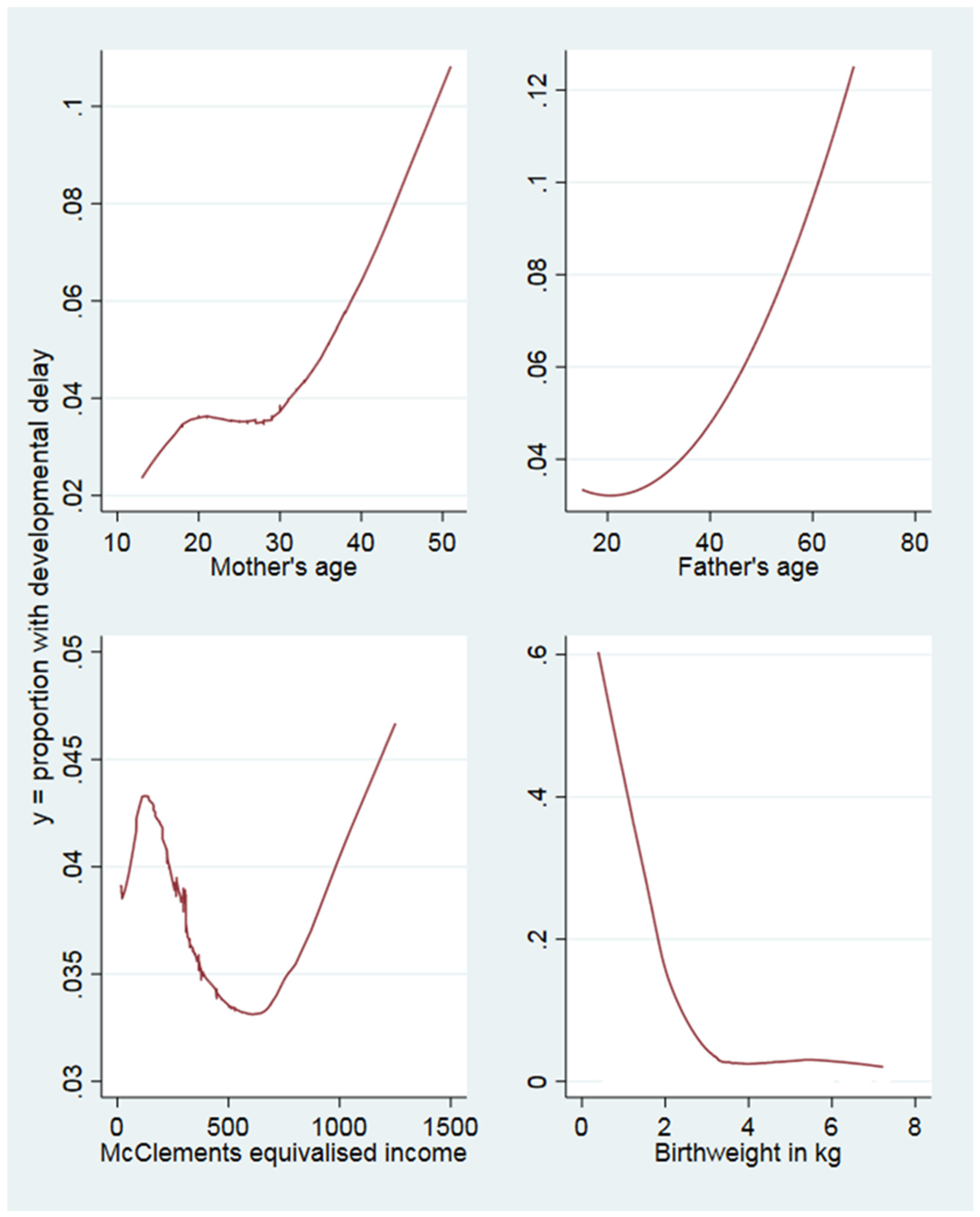Submitted:
29 March 2023
Posted:
29 March 2023
You are already at the latest version
Abstract
Keywords:
1. Introduction
2. Methods
Population and sample
Outcome variable
Predictor variables (features)
Data analysis
3. Results
Descriptive statistics
RF algorithms
4. Discussion
Study limitations
Conclusion
Supplementary Materials
Funding
Ethics Statement
Data Sharing Statement
Conflicts of Interest
References
- Sadruddin, A.F.; Ponguta, L.A.; Zonderman, A.L.; Wiley, K.S.; Grimshaw, A.; Panter-Brick, C. How do grandparents influence child health and development? A systematic review. Social Science & Medicine 2019, 112476. [CrossRef]
- Erel, O.; Oberman, Y.; Yirmiya, N. Maternal versus nonmaternal care and seven domains of children’s development. Psychological Bulletin 2000, 126(5), 727–747. [CrossRef]
- Crnic, K.A.; Greenberg, M.T.; Ragozin, A.S.; Robinson, N.M.; Basham, R.B. Effects of Stress and Social Support on Mothers and Premature and Full-Term Infants. Child Development 1983, 54(1), 209. [CrossRef]
- Shaver, J.H.; Power, E.A.; Purzycki, B.G.; Watts, J.; Sear, R; Shenk, M.K.; Sosis, R.; Bulbulia, J.A. Church attendance and alloparenting: an analysis of fertility, social support and child development among English mothers. Philosophical Transactons of the Royal Society B. 2020, 375, 20190428. [CrossRef]
- Sacker, A.; Quigley, M.A.; Kelly, Y.J. Breastfeeding and Developmental Delay: Findings From the Millennium Cohort Study. Pediatrics 2006, 118(3), e682–e689. [CrossRef]
- Chiu, W.C.; Liao, H.F.; Chang, P.J.; Chen, P.C.; Chen, Y.C. Duration of breast feeding and risk of developmental delay in Taiwanese children: a nationwide birth cohort study. Paediatric and Perinatal Epidemiology 2011, 25: 519–527.
- Belsky, J. Early child care and early child development: Major findings of the NICHD study of early child care. European Journal of Developmental Psychology 2006, 3(1), 95–110. [CrossRef]
- Waynforth, D. Effects of Conception Using Assisted Reproductive Technologies on Infant Health and Development: An Evolutionary Perspective and Analysis Using UK Millennium Cohort Data. Yale Journal of Biology & Medicine 2018, 91, 225–235.
- Brown, M.A.; McIntyre, L.L.; Crnic, K.A.; Baker, B.L.; Blacher, J. Preschool Children With and Without Developmental Delay: Risk, Parenting, and Child Demandingness. Journal of Mental Health Research in Intellectual Disabilities 2011, 4(3), 206–226. [CrossRef]
- Conde-Agudelo, A.; Castaño, F.; Norton, M.H.; Rosas-Bermudez, A. Effects of Birth Spacing on Maternal, Perinatal, Infant, and Child Health: A Systematic Review of Causal Mechanisms Studies in Family Planning 2012, 43, 93–114. [CrossRef]
- McIntire, D.D.; Bloom, S.L.; Leveno, K.; Casey, B.M. Birth Weight in Relation to Morbidity and Mortality among Newborn Infants. New England Journal of Medicine 1999, 340, 1234–1238. [CrossRef]
- Ketterlinus, R.D.; Henderson, S.H.; Lamb, M.E. Maternal age, sociodemographics, prenatal health and behavior: Influences on neonatal risk status. Journal of Adolescent Health & Care 1990, 11, 423–431. [CrossRef]
- Ozkan, M.; Senel, S.; Arslan, E.A. et al. The socioeconomic and biological risk factors for developmental delay in early childhood. Eur J Pediatr. 2012, 171, 1815–1821. [CrossRef]
- Liu, X.; Sun, Z.; Neiderhiser, J. M.; Uchiyama, M.; Okawa, M. Low birth weight, developmental milestones, and behavioral problems in Chinese children and adolescents. Psychiatry Research 2001, 101(2), 115–129. [CrossRef]
- Van Dokkum, N.H.; Reijneveld, S.A.; Heymans, M.W.; Bos, A.F.; de Kroon, M.L.A. Development of a Prediction Model to Identify Children at Risk of Future Developmental Delay at Age 4 in a Population-Based Setting. International Journal of Environmental Research and Public Health 2020, 17(22), 8341. [CrossRef]
- Abubakar, A.; Holding, P.; Van de Vijver, F.J.R.; Newton, C.; van Baar, A. Children at risk for developmental delay can be recognised by stunting, being underweight, ill health, little maternal schooling or high gravidity. Journal of Child Psychology and Psychiatry 2009, 51(6), 652–659. [CrossRef]
- Najman, J.M.; Bor, W.; Morrison, J.; Andersen, M.; Williams, G. Child developmental delay and socio-economic disadvantage in Australia: A longitudinal study. Social Science & Medicine 1992, 34(8), 829–835. [CrossRef]
- Myszczynska, M.A.; Ojamies, P.N.; Lacoste, A.M.B. et al. Applications of machine learning to diagnosis and treatment of neurodegenerative diseases. Nature Reviews: Neurology 2020, 16, 440–456. [CrossRef]
- Goecks, J.; Jalili, V.; Heiser, L.M.; Gray, J.W. How Machine Learning Will Transform Biomedicine, Cell 2020, 181, 92-101. [CrossRef]
- Usta, M.B.; Karabekiroglu, K,; Say, G.N.; Gumus, Y.Y.; Aydın, M.; Sahin, B.; Bozkurt, A.; Karaosman. A.A.; Cobanoglu, C.; Kurt, D.A.; Kesim, N.; Sahin I. Can We Predict Psychiatric Disorders at the Adolescence Period in Toddlers? A Machine Learning Approach. Psychiatry and Behavioral Sciences 2020,10(1):7-12. [CrossRef]
- Harrison, E.; Syed, S.; Ehsan, L. et al. Machine learning model demonstrates stunting at birth and systemic inflammatory biomarkers as predictors of subsequent infant growth – a four-year prospective study. BMC Pediatrics 2020, 20, 498. [CrossRef]
- Vora, N.; Bianchi, D.W. Genetic considerations in the prenatal diagnosis of overgrowth syndromes. Prenatal. Diagnosis 2009, 29: 923-929. [CrossRef]
- Patel, M.; Waynforth, D. Influences of zero hour contracts and disability–Analysis of the 1970 British Cohort study. SSM-Population Health 2022, Jul 31:101182.
- Grömping, U. Variable Importance Assessment in Regression: Linear Regression versus Random Forest. The American Statistician 2009, 63(4), 308-319. [CrossRef]
- Breiman, L. Random Forests. Machine Learning 2001, 45, 5–32.
- Ketende, S.; Jones, E. User Guide to Analysing MCS Data using Stata. 2011. London, Centre for Longitudinal Studies.
- Connelly, R.; Platt, L. Cohort Profile: UK Millennium Cohort Study: MCS. International Journal of Epidemiology 2014, 43, 1719–1725.
- Bricker, D.; Squires, J.; Mounts, L.; Potter, L.; Nickel, R; Twombly, E.; Farrell, J. Ages and stages questionnaire. Baltimore, MD: Paul H. Brookes. 1999.
- Schonlau, M.; Zou, R.Y. The Random Forest Algorithm for Statistical Learning., The Stata Journal 2020, 20, 3-29.



| Variable | Coding | Obs | Mean (Std.Dev.) | Min-Max | ||||
| Outcome and its constituent child development measures | ||||||||
| Development below fifth percentile | Above 5th percentile =0, below =1 | 18432 | .039 (.193) | 0-1 | ||||
| Smiles | 1=often, 2=sometimes, 3=not yet | 18432 | 1.006 (.082) | 1-3 | ||||
| Sits up | 18432 | 1.066 (.318) | 1-3 | |||||
| Stands up holding on | 18432 | 1.475 (.78) | 1-3 | |||||
| Puts hands together | 18432 | 1.209 (.532) | 1-3 | |||||
| Grabs objects | 18432 | 1.01 (.117) | 1-3 | |||||
| Holds small objects | 18432 | 1.147 (.454) | 1-3 | |||||
| Passes a toy | 18432 | 1.065 (.295) | 1-3 | |||||
| Walks a few steps | 18432 | 2.81 (.519) | 1-3 | |||||
| Gives a toy | 18432 | 1.52 (.717) | 1-3 | |||||
| Waves bye-bye | 18432 | 1.912 (.839) | 1-3 | |||||
| Extends arms | 18432 | 1.205 (.499) | 1-3 | |||||
| Nods for yes | 18432 | 2.72 (.617) | 1-3 | |||||
| Family & social support | ||||||||
| Frequency mother sees her mother | 0=lives with mother, 1=every day, to 8=never | 18544 | 3.277 (2.352) | 0-8 | ||||
| Mother has other parents to talk to | 1=most, to 5=least | 17805 | 2.096 (1.016) | 1-5 | ||||
| Family would help if financial problems | Strongly agree=1 to strongly disagree=5 | 17803 | 1.747 (.971) | 1-5 | ||||
| Number of types of financial help from grandparents | Gifts, money for daycare, essentials, trust funds, household items, other | 18547 | 1.235 (1.057) | 0-6 | ||||
| Frequency mother reports spending time with friends | 1=every day, to 5=never or no friends | 18527 | 2.958 (.974) | 1-5 | ||||
| Number of people who attended birth | 18432 | 1.12 (.495) | 0-4 | |||||
| Family-based infant care in work hours | 1=no, 2=yes | 18387 | 1.17 (.375) | 1-2 | ||||
| Grandparent lives in household | 1=yes, 2=no | 18432 | 1.921 (.269) | 1-2 | ||||
| Socioeconomic indicators | ||||||||
| Equivalised household income | McClement’s equivalised income | 18432 | 296.833 (217.102) | 14.31-1250.78 | ||||
| Age mother left full time education | 18341 | 17.578 (2.848) | 5-36 | |||||
| Partner’s SES from job | NS-SEC 7 classes, 1=highest, 7=lowest, 8=not in work | 18432 | 5.352 (2.641) | 1-8 | ||||
| Partner’s employment status | 1=employed, 2=self-employed, 3=looking for work, 4=not seeking work due to health, 5=New Deal/ apprenticeship, 6=student, 7=no partner/unknown | 18432 | 3.388 (3.084) | 1-8 | ||||
| Mother employed | Mother in paid work at 9 month interview=1, else=2 | 18399 | 1.448 (.497) | 1-2 | ||||
| Winter temperature in room where baby sleeps | 5-point scale where 1 = warmest and 5 = cold | 18310 | 2.301 (.745) | 1-5 | ||||
| Mother’s report of pollution & grime in neighbourhood | Reported on a 4-point scale, 1 = most, to 4 = least pollution | 18218 | 3.089 (.892) | 1-4 | ||||
| Infant characteristics | ||||||||
| Infant’s sex | 1=male, 2=female | 18432 | 1.487 (.5) | 1-2 | ||||
| Infant has all immunisations | 1=yes, 2=no | 18175 | 1.039 (.194) | 1-2 | ||||
| Infant’s age in days when mother was interviewed | 18432 | 295.487 (15.23) | 243-382 | |||||
| Infant’s number of reported illness | 18422 | 1.633 (1.992) | 0-50 | |||||
| Infant’s number of accidents | 18430 | .083 (.296) | 0-5 | |||||
| Beliefs about parenting & parenting practices | ||||||||
| Beliefs: Baby should be picked up when cries | 1=strongly agree, to 5=strongly disagree | 17810 | 2.966 (1.045) | 1-5 | ||||
| Beliefs: Stimulation is important for infant development | 1=strongly agree, to 5=strongly disagree | 17806 | 1.431 (.626) | 1-5 | ||||
| Beliefs: Talking to infants is important | 1=strongly agree, to 5=strongly disagree | 17814 | 1.200 (.448) | 1-5 | ||||
| Beliefs: cuddling infants is important | 1=strongly agree, to 5=strongly disagree | 17815 | 1.191 (.452) | 1-5 | ||||
| Bed co-sleeping main sleeping arrangement in first 9 months | 1=no, 2=yes | 18431 | 1.089 (.285) | 1-2 | ||||
| Breastfed at least 1 week | 1=no, 2=yes | 18431 | 1.536 (.499) | 1-2 | ||||
| Work hours infant care is daycare centre | 1=no, 2=yes | 18432 | 1.115 (.319) | 1-2 | ||||
| Main work hours infant care is mother | 1=no, 2=yes | 18432 | 1.691 (.462) | 1-2 | ||||
| Variable | Coding | Obs | Mean (Std.Dev.) | Min-Max | ||||
| Factors in pregnancy & birth | ||||||||
| Birthweight (kg) | 18382 | 3.344 (.589) | .39-7.23 | |||||
| Number of pharmacological pain interventions in labour | 18293 | .731 (.667) | 0-4 | |||||
| Infant conceived using fertility treatment | 1=no, 2=yes | 18425 | 1.974 (.159) | 1-2 | ||||
| Duration of labour | In hours, C-section=0 | 17680 | 9.160 (11.145) | 0-100 | ||||
| Type of delivery | 1=normal, C-section & emergency=2 | 18398 | 1.313 (.464) | 1-2 | ||||
| Singleton birth | 1=singleton, 2=twin, 3=triplet | 18432 | 1.014 (.123) | 1-3 | ||||
| Pregnancy illnesses (e.g., preeclampsia) | 1=yes, 2=no | 18396 | 1.623 (.485) | 1-2 | ||||
| Place of birth | Hospital=1, else 2 | 18401 | 1.020 (.142) | 1-2 | ||||
| How long mother and infant stayed in hospital after birth | 1=weeks, 2=days, 3=hours | 18020 | 2.046 (.421) | 1-3 | ||||
| Received full ante-natal care | 1=yes, 2=no | 18391 | 1.038 (.192) | 1-2 | ||||
| Maternal factors | ||||||||
| Mother’s birth year | 18426 | 1972 (5.95) | 1949-1987 | |||||
| Mother reports being tired all the time | 1=yes, 2=no | 17805 | 1.509 (.5) | 1-2 | ||||
| Mother reports being depressed | 1=yes, 2=no | 17802 | 1.849 (.358) | 1-2 | ||||
| Average number of cigarettes mother smokes per day | 18420 | 3.315 (6.271) | 0-60 | |||||
| Frequency mother drinks alcohol | Every day=1 to never=7 | 18429 | 5.134 (1.49) | 1-7 | ||||
| Mother has longstanding illness | 1=yes, 2=no | 18425 | 1.789 (.408) | 1-2 | ||||
| Number of months pregnant at interview | 18423 | .196 (1.013) | 0-10 | |||||
| Paternal & family factors | ||||||||
| Ethnicity | 1=white, 2=mixed, 3=India, 4=Pakistani, 5=Bangladeshi, 6=Caribbean, 7=African, 8=East Asian & others | 18402 | 1.627 (1.609) | 1-8 | ||||
| Father present in household | 0=yes, 1=no | 18403 | .172 (.378) | 0-1 | ||||
| Father’s age when infant was born | 18395 | 31.91 (5.713) | 15-68 | |||||
| Paternal involvement score: how much help father is | Summed score of how often father does: general childcare, feeding, getting up in night, changing nappies. 1=least, to 21=most | 16255 | 10.205 (5.868) | 1-21 | ||||
| Birth interval in months from older sibling | 8997 | 42.803 (27.86) | 9-318 | |||||
| Number of siblings in household | 18432 | .938 (1.081) | 0-9 | |||||
| Mother reports partner sensitive and aware of her needs | Strongly agree=1 to strongly disagree=5 | 14358 | 1.986 (.929) | 1-5 | ||||
| Observations correctly classified by RF algorithms | ||
|---|---|---|
| All 52 predictors (oob=0.0389) | Only top 5 features from IF scores in full model (oob=0.0393) |
|
| Cases with developmental delay | 659/687 (96%) |
681/687 (99%) |
| Cases without developmental delay | 17,716/17,716 (100%) |
17,716/17,716 (100%) |
Disclaimer/Publisher’s Note: The statements, opinions and data contained in all publications are solely those of the individual author(s) and contributor(s) and not of MDPI and/or the editor(s). MDPI and/or the editor(s) disclaim responsibility for any injury to people or property resulting from any ideas, methods, instructions or products referred to in the content. |
© 2023 by the authors. Licensee MDPI, Basel, Switzerland. This article is an open access article distributed under the terms and conditions of the Creative Commons Attribution (CC BY) license (http://creativecommons.org/licenses/by/4.0/).





